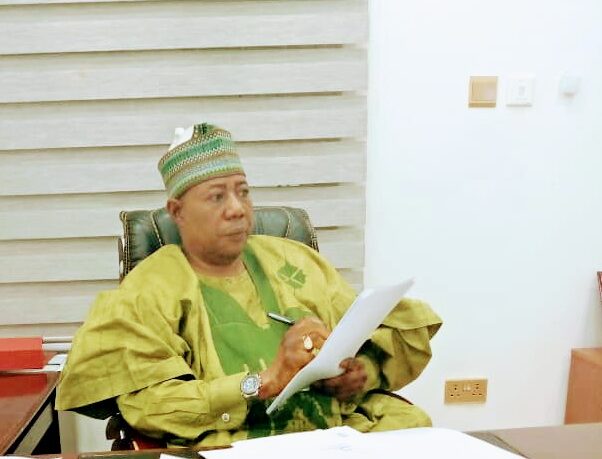Just as there is a saying that the law is made for the people, and not the people for the law, so does government exists at the instance of the people and it is only the people who should determine the direction, patterns and actions of their government. Anything short of this is autocracy, inimical to democratic ethos.
Last Thursday’s approval of a five billion naira (N5,000,000,000.00) and five trucks of rice palliatives to each state of Nigeria and the Federal Capital Territory (FCT) climaxed a robust demonstration of President Bola Ahmed Tinubu’s people-centred approach to governance.
This is a clear demonstration of the law or government existing for the people and not the other way round. It also validates Abrahim Lincoln’s famous Gettysburg Declaration, where he described “democracy as government of the people, by the people and for the people.”
When the voices and will of the people is removed from governance that is the beginning of autocratic system. In summary, the will and voices of the people is the oxygen that sustains Democracy.
The President Tinubu-led government has demonstrated that it is people-centred, responsive and represents Renewed Hope for Nigeria. This was aptly demonstrated by the way Tinubu’s administration responded to the outcry that trailed the announcement that the federal government was going to disburse N8,000 to 12 million households within six months from the N500 billion approved by the National Assembly to cushion the effect of fuel subsidy removal. The decision did not go down well with most Nigerians who feel N8,000 was way too insignificant to assuage the hardship occassioned by the policy.
In response to the feelings and pulse of Nigerians, the president ordered the immediate holistic review of the palliatives. That is a leader that is not seeing political power in personal terms but understands it from the prism of the people’s voices and will.
The latest palliative as announced by government on Thursday is to cushion the harsh effects of the removal of fuel subsidy on Nigerians. According to the plans, governors are expected to procure 100,000 bags of rice, 40,000 bags of maize and fertilizers.
By this singular step to ameliorate the sufferings of Nigerians, President Tinubu has done well. However, permit me to point out that the problem of Nigeria has not been absence of policies or disbursement but getting to the taregetted beneficiaries. A saying goes that those who don’t learn from history repeat historical mistakes.
Let me appeal to Nigerians that throughout history, all economic triumphs of every society comes through tears and sweats and sometimes with blood. It’s like a saying that “you can’t climb the ladder of success with two hands in the pocket.” It is self-deception to think that economic victory can be won without embracing painful reforms with its attendant pains. Collective sacrifices is word. When we endure the pains and support the government now, we’ll enjoy later. It is like the saying: “no pains no gain.”
In Nigeria, collective amnesia has been one of the greatest challenge to our national consciousness. No matter the gravity of assault on our national or collective will, we are quick to brush it aside and move on. Hence, the difficulty in learning from the past or our mistakes.
I am saying this against the backdrop of what was witnessed in the last quarter of 2020 where governors, instead of distributing the COVID-19 palliatives supplied to states and FCT to ease the suffering of Nigerians, decided to hoard them in stores and warehouses until the people lost patience and decided to take the law into their hands. What was evident at the time was that governors were hoarding those items in order to be used for political patronage.
If extra care to monitor implementation of the palliatives is not taken this time around, the same old pattern might repeat itself. This is more so that the Independent National Electoral Commission (INEC) has fixed November 11 to conduct off-season governorship election in three states of Kogi, Imo and Bayelsa. Palliatives of N5billion and five trucks of rice coming less than three months to these crucial elections might as well be campaign items that can only be accessed by the supporters and loyalists of the ruling parties. In which case the aim would have been defeated.
It is important to advise that President Tinubu must as a matter of urgency to set-up a taskforce to monitor the implementation and distribution of these palliatives, so it doesn’t go the way of previous ones. In line with the trend that has already been established, Nigerians blame everything on the president of the country, looking away from holding to account their governors, who controls both state and local government allocations.
These palliatives, if not well handled will see Nigerians hold Tinubu by the joggler for the failure of state governments to do the right things in the end. [20/08, 3:10 pm] degeorgianclass: Tinubu, FG’s N5bn Palliative And The Pitfalls We Must Avoid.
Just as there is a saying that the law is made for the people, and not the people for the law, so does government exists at the instance of the people and it is only the people who should determine the direction, patterns and actions of their government. Anything short of this is autocracy, inimical to democratic ethos.
Last Thursday’s approval of a five billion naira (N5,000,000,000.00) and five trucks of rice palliatives to each state of Nigeria and the Federal Capital Territory (FCT) climaxed a robust demonstration of President Bola Ahmed Tinubu’s people-centred approach to governance.
This is a clear demonstration of the law or government existing for the people and not the other way round. It also validates Abrahim Lincoln’s famous Gettysburg Declaration, where he described “democracy as government of the people, by the people and for the people.”
When the voices and will of the people is removed from governance that is the beginning of autocratic system. In summary, the will and voices of the people is the oxygen that sustains Democracy.
The President Tinubu-led government has demonstrated that it is people-centred, responsive and represents Renewed Hope for Nigeria. This was aptly demonstrated by the way Tinubu’s administration responded to the outcry that trailed the announcement that the federal government was going to disburse N8,000 to 12 million households within six months from the N500 billion approved by the National Assembly to cushion the effect of fuel subsidy removal. The decision did not go down well with most Nigerians who feel N8,000 was way too insignificant to assuage the hardship occassioned by the policy.
In response to the feelings and pulse of Nigerians, the president ordered the immediate holistic review of the palliatives. That is a leader that is not seeing political power in personal terms but understands it from the prism of the people’s voices and will.
The latest palliative as announced by government on Thursday is to cushion the harsh effects of the removal of fuel subsidy on Nigerians. According to the plans, governors are expected to procure 100,000 bags of rice, 40,000 bags of maize and fertilizers.
By this singular step to ameliorate the sufferings of Nigerians, President Tinubu has done well. However, permit me to point out that the problem of Nigeria has not been absence of policies or disbursement but getting to the taregetted beneficiaries. A saying goes that those who don’t learn from history repeat historical mistakes.
Let me appeal to Nigerians that throughout history, all economic triumphs of every society comes through tears and sweats and sometimes with blood. It’s like a saying that “you can’t climb the ladder of success with two hands in the pocket.” It is self-deception to think that economic victory can be won without embracing painful reforms with its attendant pains. Collective sacrifices is word. When we endure the pains and support the government now, we’ll enjoy later. It is like the saying: “no pains no gain.”
In Nigeria, collective amnesia has been one of the greatest challenge to our national consciousness. No matter the gravity of assault on our national or collective will, we are quick to brush it aside and move on. Hence, the difficulty in learning from the past or our mistakes.
I am saying this against the backdrop of what was witnessed in the last quarter of 2020 where governors, instead of distributing the COVID-19 palliatives supplied to states and FCT to ease the suffering of Nigerians, decided to hoard them in stores and warehouses until the people lost patience and decided to take the law into their hands. What was evident at the time was that governors were hoarding those items in order to be used for political patronage.
If extra care to monitor implementation of the palliatives is not taken this time around, the same old pattern might repeat itself. This is more so that the Independent National Electoral Commission (INEC) has fixed November 11 to conduct off-season governorship election in three states of Kogi, Imo and Bayelsa. Palliatives of N5billion and five trucks of rice coming less than three months to these crucial elections might as well be campaign items that can only be accessed by the supporters and loyalists of the ruling parties. In which case the aim would have been defeated.
It is important to advise that President Tinubu must as a matter of urgency to set-up a taskforce to monitor the implementation and distribution of these palliatives, so it doesn’t go the way of previous ones. In line with the trend that has already been established, Nigerians blame everything on the president of the country, looking away from holding to account their governors, who controls both state and local government allocations.
These palliatives, if not well handled, will see Nigerians hold Tinubu by the joggler for the failure of state governments to do the right things in the end. In monitoring the distribution of the palliatives across the country, President Tinubu should involve office of the National Security Adviser and NFIU for accountability within system. It is even imperative now that we have a no-nonsense anti-corruption czar like Mallam Nuhu Ribadu as the NSA. The Ribadu-led security team and the NFIU must be on their toes to ensure the palliatives get to the people they are
As I conclude, let me emphasise that only a very infinitesimal number of Nigerians wants the subsidy regime to remain. Why? Because fuel subsidy that started as an innocent attempt by government of the past, especially the late 70’s/80’s to make Premium Motor Spirit (PMS) affordable to Nigerians has become a hydra-headed monster, a pains in the ass of every Nigerian, that if not taken out of the way, may sell Nigeria into economic slavery.
The huge debt yoke hanging on Nigeria’s neck today is the direct consequences of payment of fuel subsidy. After payment of this dubious scheme, not much is left to run the government, hence, the resort to borrowing. Let’s bite the bullet at once for a greater tomorrow.
– Ibrahim is director, Communication and Strategic Planning, of the Presidential Support Committee (PSC).



